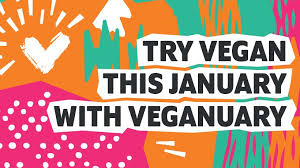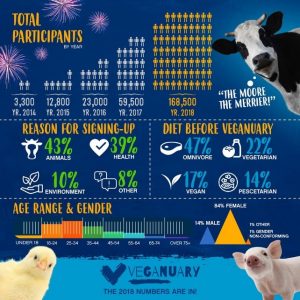Veganuary! Its Popularity Continues to Increase!
Posted by Phil Heler on January 10, 2020With more people signing up to Veganuary each year, it is worthwhile looking at the health benefits that a plant-based and dairy-free diet promotes even for just one month.
This week’s artcile is a retort to all those desserts, cheese boards, booze, turkey (and meat free equivalents) and other food related excesses that we enjoy as part of a Christmas tradition. A huge part of any retailer’s annual sales and profits occur in the three months before Christmas.
While online and high street retailers feed our seasonal excess, many health-related businesses clearly profit from our guilt immediately after. It is money making time for the gym industry!
According to one digital marketing company there was a 315% increase in the term ‘gym’ (or closely related words) on Google last year at New Year.
Gold’s Gym, which has 700 locations on six continents and serves two million people, experienced a 40% increase in traffic between December and January in the same period! But January is also an ideal time to promote other aspects of our well-being, with a key drive being our diet.
Veganuary is Gaining Momentum
January as a month and specifically as a noun is derived from the Latin god ‘Janus’ (god of new beginnings and transitions). It has also become yet another example of a ‘portmanteau’. Just like November (‘Movember’) January is increasingly becoming recognised as ‘Veganuary’.
A portmanteau is of course a word blending the sounds and combining the meanings of two other words. This initiative sees people pledging to trial veganism for the month of January. Last year Veganuary generated 168,500 participants and this year there are already 250,000 who have signed up.
There are other campaigns such as vegan before 6 pm (VB6) diet, which is gaining popularity in the US, principally as a means of losing weight.
It is a good idea as generally after 6 p.m. you might be sharing a meal with family and I personally cannot see my 11 year old son eating a vegan meal! The meat-free Mondays campaign is also getting traction, with more restaurants offering vegan options as well as vegetarian ones.
The Vegan Society website gives a definition of veganism as ‘a philosophy and way of living which seeks to exclude – as far as possible and practicable – all forms of exploitation of, and cruelty to animals for food, clothing or any other purpose’. There are a range of reasons for people reducing in part, or wholly, meat intake as seen below.
Plant Based Diets are becoming More Popular
The UK meat-free market is set to expand at an exponential rate driven by increasing demand from vegans and vegetarians. The total value of the industry is expected to grow from £559m in 2016 to £658m in 2021. We in the UK launched more vegan products than any country as the number of vegans quadrupled between 2014 and 2018.
London has also been officially named the world’s most vegan-friendly city, according to an annual ranking from an online restaurant guide called the HappyCow. HappyCow claims to be the largest vegan and vegetarian restaurant guide in the world, looking at options in more than 180 countries. All these factors help drive Veganuary as numbers of participants rise year on year.
Plant Based Diets are seen as the Diet of the Future
Plant based diets are of course increasingly seen as a means of progression in order to feed and expanding global population sustainably whilst addressing climate change. Veganuary is very much inline with this requirement. The chances are that what we will soon eat will be loosely based on a report called the ‘Eat-Lancet’ report which was published in January 2019.
Globally, the diet requires red meat and sugar consumption to be cut by half, while vegetables, fruit, pulses and nuts must double! In specific countries and cultures these changes will be very tough.
This is the first science-based diet that actually succeeds in balancing an optimal diet for our health, without perpetuating environmental degradation and one that could conceivably feed 10 billion people by the year 2050. A plant-based diet does not necessarily imply that you are required to be vegan of course but any plant-based diet is fundamentally a step in the right direction. Veganuary as an initiative is no bad thing!
Market penetration of Veganism
Veganism is a rapidly growing lifestyle choice for urban millennials, but there are great swathes of the population who find the notion incomprehensible.
On BBC 3 at the moment there is a very interesting documentary called ‘Veganville’ which documents the journey of four vegans who travel to Merthyr Tydfil in order to introduce the concept of the vegan way of life. Merthyr Tydfil is in the centre of the Welsh agricultural heartlands where farming is a way of life, so you can imagine the narrative.
The programme asks people to pledge to either attempt just one vegan meal, be vegan for a day, month or year or even sustain a vegan lifestyle in perpetuity. So, what would it mean for us if we were vegan for one month and would this benefit our health? Afterall a part-time vegan diet is more manageable and offers a portion of the same benefits. So Veganuary could be a good choice to just how practicable it is for you!
What are the Health Benefits of Trialling Plant-Based Diets?
What was recently very interesting was that 19 staff of the ‘New Scientist’ magazine volunteered to go vegan for one week as a small-scale experiment, they then detailed their findings. In order to do this, they teamed with researchers from the Livestock, Environment and People (LEAP) programme at the University of Oxford so they could run it as a proper scientific pilot experiment. These 19 people kept food diaries for a fortnight, eating their usual diet for the first week and sticking to a vegan diet for the second.
Of these people most were traditionally meat eaters, except for three pescatarians and three vegetarians. The LEAP researchers analysed their diaries in order to correspond environmental or nutritional benefits.
One of the spin-offs they discovered was that once they had succeeded in eating vegan for a week it did appear to influence their choices after they had returned to omnivorous eating. This appears to be supported by unpublished research from the consultancy agency Kantar (one of the world’s largest research and data agencies) .
Supermarket till receipts of more than 600 people in the UK who gave up meat for January in 2018 found that a year later they purchased less meat and eggs (although their milk and cheese consumption slightly increased).
The three vegetarian participants, over the course of the two weeks, also appeared to have a reduced dietary carbon footprint of 42 per cent on average, showing that serious carbon savings are possible. This is significant as food in general makes about 25% of our overall carbon footprint. It is difficult to draw serious conclusions from just three people, but it does raise possibilities.
Is a Plant-Based Diet Better for the Environment?
This doesn’t necessarily indicate that plant-based foods are not detrimental to the environment. An important study published in 2018 in the ‘Science’ journal by Poore and Nemeck which looked at reducing food environmental impact suggested that cultivating peas and nuts required more water than the equivalent weight of beef. Almonds in particular require large amounts of pesticides and fertilisers.
Western demand has also elevated the cost of quinoa and avocados to the extent that these staples have now become unaffordable in the countries from where they are sourced.
Mexico now makes more money exporting avocados than oil!However, in general animal based products are much worse for the environment and the authors of this study concluded by stating that ‘even if we could reduce all animal based products to their lowest impact, it would still be better for the environment to stop eating meat as a protein source’.
It is well known that soy plantations are a driver for deforestation, but the main reason for this is that soy proteins are a key constituent for animal feed.
Charlotte Streck, director of the Climate Focus think tank in the Netherlands put it in perspective by stating in 2017 that ‘even if we all replaced meat with soy, we would still have a huge decrease in soy production because so much of it is for animal consumption’.
Climate Focus found that 26,700 square kilometres of forest are cleared each year to graze cattle and grow crops to feed livestock. Soy plantations, by contrast, account for 6000 square kilometres of cleared forest each year. So Veganuary is no bad thing.
Results of ‘New Scientist’ Pilot Study on Trialling Veganuary
Back to our small pilot study! In the week when these 19 volunteers ate vegan they consumed fewer calories and less saturated fat, carbohydrate and cholesterol, while significantly increasing their fibre intake. On a much broader scale the general economic and health benefits of people shifting towards plant-based diets are obvious.
High levels of meat consumption correspond to high levels of coronary heart disease, strokes, type 2 diabetes and cancer. Marco Springmann at the University of Oxford has looked at the costs of these illnesses. He estimates that if the entire world went vegetarian, we could avoid 7.3 million early deaths each year – 8.1 million if everyone were vegan.
Back to our small pilot study again. On average the participants ate 21g of fibre on their usual diets, but this increased to 30g per day when they ate their vegan diet; 30g is the recommended target for the UK. There were some interesting findings when it came to protein. The three pescatarians averaged 65g of protein on their normal diet but this actually marginally increased when they ate their vegan diet to 67g.
The average iron intake in the meat eaters (we all know red meat is a valuable source) only fell from 5g to 4g. One thing that was noticeable is that calcium intake appeared to reduce for 81% of their daily allowance to 66% for the vegetarians when they switched diets. Calcium is available however in various alternative milks and supplements under a vegan diet.
Nutrients that everyone needs to be aware of on a vegan diet
B12 Because this vitamin is mainly found in meat, dairy products and eggs, vegans must get it from other sources such as supplements, fortified breakfast cereals and Marmite. Deficiency can lead to irreversible nervous system damage.
Vitamin D Our skins make vitamin D when exposed to the sun’s ultraviolet rays. But with desk-bound jobs, long winters and unpredictable weather, it is not always possible to get enough. Vitamin D is crucial for bone growth in children, and deficiency can result in rickets.
Oily fish is one of the best dietary sources, but vegans can obtain it from fortified breakfast cereals and margarine. People living in Scotland may need to take greater care over vitamin D, as with may people from cultures that require them to cover their bodies.
Calcium Found in dairy products, this is essential for strong bones. It is often lacking in a vegan diet unless taken as a supplement.
Iron Without enough iron, vegans and vegetarians can become anaemic. Deficiency can also delay growth in toddlers. Iron is commonly found in meat, but vegetarians can source iron from pulses and leafy green vegetables.
Calories Although childhood obesity is an issue today, not enough calories can mean children don’t grow properly. This can be a problem in high-fibre diets.
Protein High-biological-value protein is found in meat, fish, eggs and dairy products. Low-biological-value protein is found in nuts, pulses and whole grains. Separately, the latter doesn’t contain all the essential amino acids but do, when combined correctly. Knowledge of which foods to mix together is therefore crucial.


